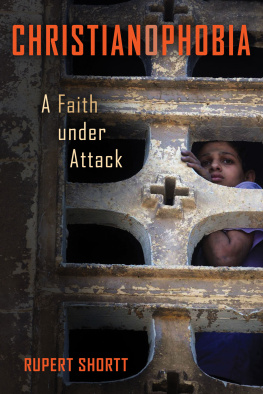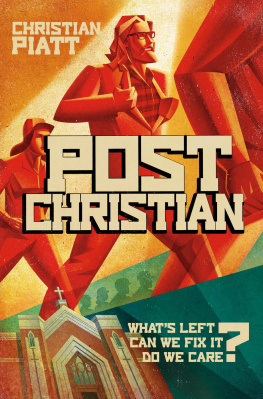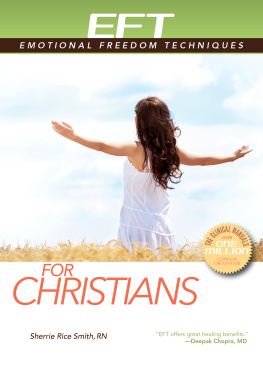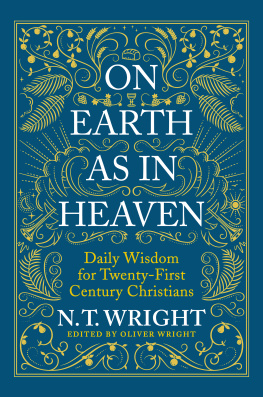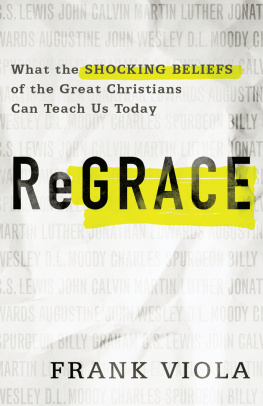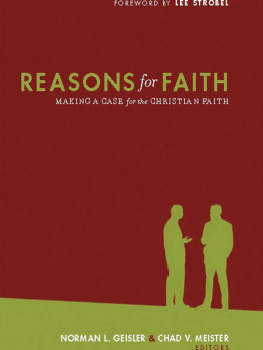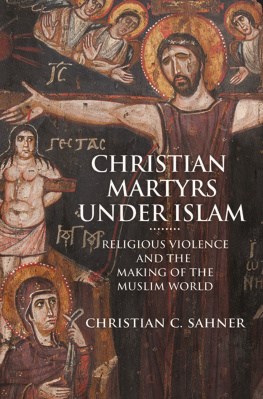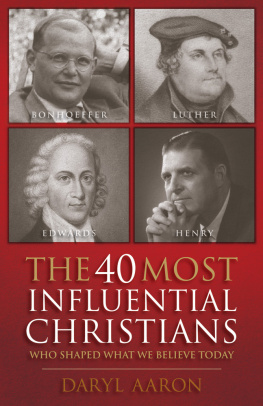CONTENTS
On October 29, 2005, three Indonesian schoolgirls were beheaded as they walked to school targeted because they were Christians. Like them, many other church members around the world face violence or discrimination for their faith. Why is this tragedy so widely ignored?
In Christianophobia, Rupert Shortt investigates the shocking treatment of Christians on several continents, revealing that they are oppressed in greater numbers than those of any other faith. The extent of official collusion in the onslaught is also exposed. Even governments that have promised to protect religious minorities routinely break their pledges, with life-shattering consequences.
Unlike their Muslim counterparts, young Christians dont easily become radicalized but tend to resist non-violently or keep a low profile. This has enabled politicians and the media to play down a problem of huge dimensions.
Shortt disentangles social and cultural strands in conflicts sometimes wrongly blamed on religion, and demonstrates how freedom of belief is the canary in the mine for liberty in general. Published at a time when the fundamental importance of faith on the world stage is at last being recognized, this book will be essential reading for anyone interested in the rights of people to believe what they wish, no matter where, or among whom, they live.
Rupert Shortt is a journalist and writer whose books include Rowans Rile: the Biography of the Archbishop, Gods Advocates and Benedict XVI: Commander of the Faith. He is Religion Editor of The Times Literary Supplement, contributes to The Guardian and The Times, and is a Visiting Fellow of Blackfriars Hall, University of Oxford.
Rowan Williams: An Introduction
Gods Advocates: Christian Thinkers in Conversation (ed)
Benedict XVI: Commander of the Faith
Rowans Rule: The Biography of the Archbishop
BLACK AND WHITE PLATES
CHRISTIANOPHOBIA
RUPERT SHORTT
Dedicated to all who suffer for their beliefs
In the video he made in early 2005 before committing suicide and mass murder, Mohammad Sidique Khan, ringleader of the 7 July London bombers, justified his action as revenge for the recent killing of Muslims by Western armies. Much has been said since about the moral vacuity of this statement, but far less made of its sheer incoherence. Looking beyond Iraq and Afghanistan, and on a time frame stretching back well before 11 September 2001, we can see innumerable Christian communities on the defensive against rampant forms of intolerance, both religious and secular. The problem has worsened dramatically since the turn of the millennium: about 200 million Christians are now under threat, more than any other faith group. This ought to be a major foreign policy issue for governments across a vast belt of the world. That it is not tells us much about a rarely acknowledged hierarchy of victimhood.
Sidique Khan and his associates were allowed to practise their religion openly in Britain, yet there is scarcely a single country from Morocco to Pakistan in which Christians are fully free to worship without harassment. Muslims who convert to Christianity or other faiths in most of these societies risk harsh penalties. There is now a severe risk that the Churches will vanish from their biblical heartlands in the Middle East. The suffering is no less acute elsewhere. Before the partition of Sudan in 2011, for example, the regime in Khartoum was responsible for the deaths of 2 million Christian and other non-Muslim civilians over a thirty-year period. Before East Timor gained independence from Indonesia, 100,000 Catholic non-combatants were killed by agents of the Suharto government during the 1970s, 1980s and 1990s. As I write, the Grand Mufti of Saudi Arabia, Sheikh Abdul Aziz bin Amdullah, has officially declared that it is necessary to destroy all the churches on the Arabian Peninsula, and 50,000 Christians are thought to have been ousted from the city of Homs in Syria.
Christians in parts of Nigeria live in regular fear of violent attack; what is more, there is clear evidence that the attitudes underlying such aggression are fomented through official channels. One reason why Western audiences hear so little about religious oppression in the Muslim world is straightforward: young Christians in Europe and America do not become radicalised, and persecuted Christians tend not to respond with terrorist violence. Another explanation is linked to the blind spots that can affect bien-pensant opinion-formers. Parts of the media have been influenced by the logical error that equates criticism of Muslims with racism, and therefore as wrong by definition. This has further distracted attention away from the hounding of Christians, helping to cement the surprisingly widespread idea that Christianity is a Western faith.
But this book is emphatically not based on polemics about a supposed clash of civilisations, still less on an uncritical attitude towards my fellow Christians. The Churchs past record of violent intolerance a record that persists in Russia, the Balkans, and other parts of the Eastern Orthodox world is obviously shameful, too. And although the view that Muslims have been the perpetual victims of Christian aggression down the ages rests on a falsification of history, I reject the equal and opposite fantasy that holds Islam to be a uniquely violent religion . Misconceptions of this sort usually spring from a failure to distinguish between Islamic piety on the one hand, and Islamism as a religio-political ideology on the other.
My argument, rather, is shaped by two sorts of awareness. First, that much anti-Christian prejudice and violence in China, India, Vietnam, North Korea, Burma, Sri Lanka, Cuba, or Israel, among other places has nothing to do with militant Islam; and second, that a number of grievances felt by Muslims are reasonable. For example, I believe (in line with the clearly broadcast views of most church leaders around the world) that the invasion of Iraq in 2003 was a serious mistake, and I have a keen awareness of the Wests role in promoting the sense of injustice felt by many Arabs in particular. More broadly, it seems equally clear to me that Christian mission in nineteenth-century Africa was often politicised, and geared to undermine the spread of Muslim influence; that Western (above all Anglo-French) adventurism in the Middle East during the twentieth century played into the hands of Arab nationalists and watered the seeds of Islamic revivalism; and that al-Qaeda drew strength from the Wests indulgence of dictators in the region before the Arab Spring and still now. These factors supply context to my case. They do not, however, invalidate it. (Statistical evidence on religious freedom around the world, collated by the Freedom House think tank, is set out in .)
The oppression of Christians is especially worthy of note given the so-called return to religion over recent years. Whether you view this development with relief or unease, it has become increasingly obvious that Christianity and Islam are the two most formidable systems of belief in the world. Whatever the extent of secularisation in Western Europe and even here the evidence is ambiguous, as various traditions experience revivals almost all other societies on earth display high levels of religious belief and practice. Three-quarters of humanity professes a religious faith; that figure is projected to reach the 80 per cent mark by 2050. The scale of the turnaround has been extraordinary. Thanks to the so-called third wave of democratisation during the 1970s, as well as smaller waves of freedom since then, millions were enabled to shape their public lives in new ways. In country after country, politically empowered groups began to challenge the secular constraints introduced by the first generation of modernising, post-independence leaders. Often, as in Communist societies, secular straitjackets had been imposed from on high; in other cases, such as Turkey, India, and Egypt, secularism retained legitimacy because the elites considered it essential to national integration and modernisation and because of the sheer charisma of these countries founding fathers. In Latin America, right-wing dictatorships, sometimes in cahoots with the Catholic Church, imposed restrictions limiting grass-roots religious influences, particularly liberation theology and Protestant sects.
Next page
